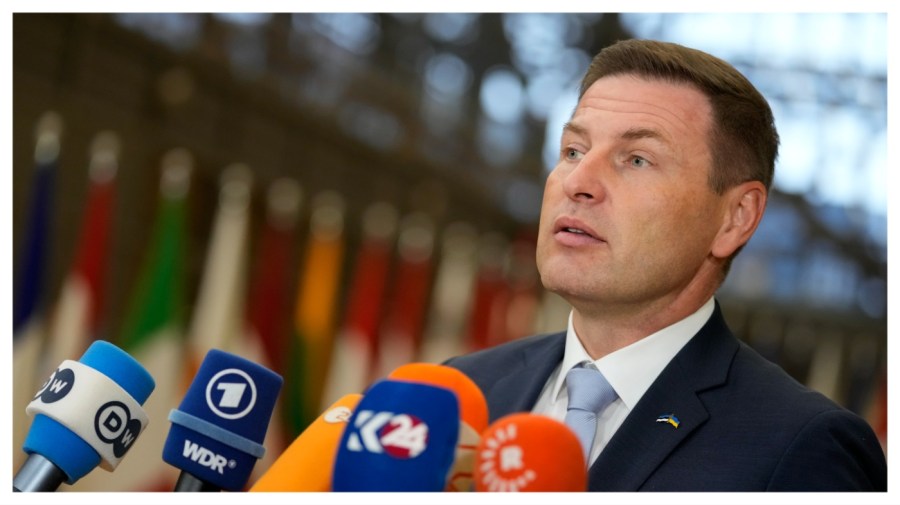[ad_1]

HALIFAX, Nova Scotia — Ukraine needs money invested into its own military production industry, not foreign troops to fight its war against Russia, Estonian Minister of Defense Hanno Pevkur told The Hill.
While President Biden has lifted restrictions on American military contractors traveling to Ukraine to assist in maintenance and repair of equipment, European leaders are reportedly debating whether to send troops into Ukraine for training and assistance. France has not rejected the possibility of sending its troops into battle.
But Pevkur said the risks of such a move outweigh the benefits, even as Ukraine faces a shortage of manpower and battles to maintain morale, and whileRussia deploys thousands of North Korean troops to bolster its frontline forces.
President Biden has lifted restrictions on American military contractors for maintenance and repair, and European leaders are reportedly debating whether sending troops into Ukraine for training and assistance. France has not rejected the possibility of sending its troops into battle.
But Pevkur said the risks of such a move outweigh the benefits, even as Ukraine faces a shortage of manpower and morale, and as Russia deploys thousands of North Korean troops to bolster its front-line forces.
”As far as I know, Ukrainians can handle all of this, when we can deliver all what they need for fighting with Russia,” Pevkur told The Hill, speaking on the sidelines of the Halifax International Security Forum over the weekend.
Nearly three years into its defensive war, Ukraine is under intense pressure to shore up any potential battlefield gains as leverage against Russian President Vladimir Putin by the time President-elect Trump arrives in office.
Trump has pledged to quickly end the war and criticized the level of U.S. spending on aiding Ukraine. While he has not specifically proposed Ukraine ceding land to Russia as part of a peace deal, many Ukraine supporters fear such a scenario.
Pevkur said Ukraine’s surprise incursion into Russia’s Kursk region in August was a missed opportunity to surge support for Kyiv.
“There was a huge momentum in this war during the Kursk counteroffensive, but that time, Ukrainians didn’t have enough equipment or enough firepower to push even further,” he said.
“I believe this was a missed opportunity for Ukrainians, together with the West. … We have to decide collectively, that are we helping Ukraine to fight or to win? So if you want to help them to win you have to make this extra step.”
Pevkur called for a renewed push to finance Ukraine’s investment in its own military production, saying the Ukrainians are building, in a year, six to seven times more howitzers than are produced in France, for example.
“Their industry is really ramping up production,” he said.
Ukrainian industry has the capacity to produce about $30 billion worth of military equipment in a year, Pevkur said, but it only has $15 billion to spend.
“That means there’s twice as much capacity in Ukrainian industry. So when you don’t have anything to give from your own stockpiles, give them money, it’s a simple message.”
Europe has collectively allocated more money to Ukraine compared to the U.S., but that hasn’t stopped Trump and his allies from demanding that European countries do more. The Kiel Institute Ukraine Support Tracker estimates that Europe has spent about $124 billion on supporting Ukraine, while the U.S. has spent about $89 billion.
Pevkur warned that the next six months of political turmoil in the U.S. and Europe — between the transition to the Trump administration and elections in Germany and France — provide an opportunity for adversaries like Russia, China, Iran and North Korea to take advantage.
“It is a time where the dictators can do a new push — what we see also in Ukraine, that Putin is trying to push very heavily at the moment,” he said.
“You have political turbulence, you have other conflicts additionally to Ukraine, put this all together and you understand dictators in different parts of the world to use this momentum,” he said, citing the wars in the Middle East and Chinese provocations in the South China Sea.
Pevkur said Putin’s use of an “experimental” intermediate-range ballistic missile (IRBM) in Ukraine last week was largely a political message in response to Biden giving Ukraine the green light to use Western-provided missiles to strike deep into Russian territory. But he said it also marked another example of Putin escalating the war.
“Every time we see something new in this war, Russia is the one that escalated,” he said.
Still, Pevkur said it is important for the West to “keep our heads cold and calm, we have to react but not overreact.”
Estonia is on alert for hybrid attacks on its own territory coming from Russia and China.
Russia is suspected of waging cyberattacks, destroying undersea cables in the Baltic Sea, sabotaging across maritime borders and jamming flight communications, to name a few such tactics that its neighbors allege are part of hybrid warfare.
“We know very clearly what Russia is capable of, that they are testing us all the time, that is why the prevention of those kinds of attacks, also reaction to those kinds of attacks is very, very important,” Pevkur said.
[ad_2]
Source link

